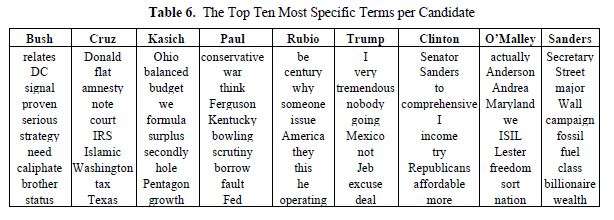Differences in the rhetorical styles of candidates in the 2016 US presidential election

A new paper published in Digital Scholarship in the Humanities reveals and quantifies dramatic differences in the speaking styles of candidates in the 2016 United States presidential election. Lexical analysis indicates that President Donald Trump had a distinct communication style, and it was far more direct than any of the other candidates.
The most frequently used thematic words are very similar across politicians, with 'people' appearing in the top 4 for 7/9 candidates, and 'say' for 5/9. Trump and Hillary Clinton had 3 out of 4 most-used words the same.
Researchers here analyzed the transcripts of the TV debates involving Jeb Bush, Hillary Clinton, Ted Cruz, John Kasich, Martin O'Malley, Rand Paul, Marco Rubio, Bernie Sanders, and Donald Trump.
According to several overall stylistic indicators, candidate Trump used a simple communication style, avoiding complex formulation and vocabulary. The authors analysed lexical density - or how much actual information there was in the words spoken. Trump scored the lowest for lexical density, and he also reused the same phrases more than other candidates.
Former governors (Bush and Kasich) tend to use "we" more frequently than "I." Usually Senators (Cruz, Paul, Clinton, and Sanders) tend to prefer using the pronoun "I."
Donald Trump presents an atypical figure, employing short sentences, a reduced vocabulary, repeating the same arguments with simple words. He is the single candidate to have the pronoun "I" in the second rank (after the article "the").
Hillary Clinton can also be characterized by a large use of the pronoun I. The candidates who stayed longer in the campaign had a clear preference for "I" over the "we." When considering overall stylistic indicators, Clinton, O'Malley, and Sanders presented a high lexical density value as well as a higher number of long and complex words than the mean.
Long sentences were preferred by O'Malley, Clinton, and Sanders. A relatively high lexical density percentage indicates a more complex text, containing more information. Using the transcripts of the TV debates, the lexical density values varied from 36.6% (Trump) to 44.6% (Cruz).
The percentage of long or complex words varied from 18.3% (Trump) to 26.4% (Cruz, and Sanders). Senators Cruz and O'Malley had a more sophisticated communication style, employing longer sentences, and a more complex lexicon.
An analysis of the top ten most specific terms per candidate reveals interesting specifics about their campaigns. Top terms used by Jeb Bush included "proven," "status," and "brother." Top terms used by Martin O'Malley included "actually" and "Maryland." Sanders preferred "Wall Street," "wealth," "class," and "billionaire." Top Clinton words included "comprehensive," "affordable," and "try." Among the top ten specific words used by Trump in the course of his campaign were "I," "Mexico," "deal," and "tremendous."
"As Trump won the primaries and the general election, does that mean that efficient communication must be based on tweet-like rhetoric and this form will dominate the future elections?" asked lead author Jacques Savoy. "Clearly the rhetoric evolution goes towards to short communication messages, but this also implies simplistic analysis and solutions? If the answer is affirmative, I see a real risk of the democracy."
More information: Analysis of the style and the rhetoric of the 2016 US presidential primaries, DOI: 10.1093/llc/fqx007
Provided by Oxford University Press



















